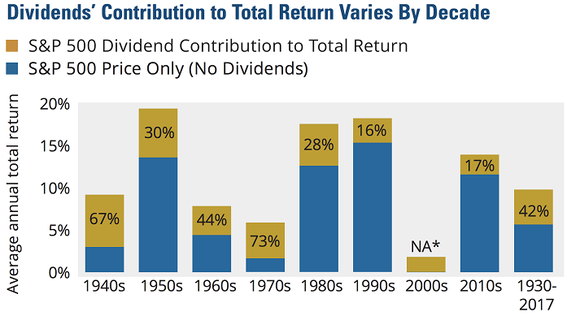Investments You Can Own Forever - The Definitive Guide
We outline investments that have a track record of creating long-lasting wealth without the need for market timing
Updated 10 May 2023
If you're looking to make long-term investments into companies that are robust, well-managed and dominate their industry, there are many to choose from. Best of all, it's never too late to invest when the company is outstanding. The reason is simple, and is best explained by a quote from Warren Buffett - "When we own portions of outstanding businesses with outstanding managements, our favourite holding period is forever."
This guide lists investments that are generally regarded as 'forever shares'; businesses that are well run, honest, priced sensibly and earn good returns on the capital invested. Please keep in mind that the list is journalistic in nature and does not constitute financial advice in any form. We aim to highlight favoured investing suggestions from a range of experts and explain why they can be considered a long-term investment option.
This guide lists investments that are generally regarded as 'forever shares'; businesses that are well run, honest, priced sensibly and earn good returns on the capital invested. Please keep in mind that the list is journalistic in nature and does not constitute financial advice in any form. We aim to highlight favoured investing suggestions from a range of experts and explain why they can be considered a long-term investment option.
Why we've published this guide:
Our guide covers:
Know this first: Avoiding the hyped share trap:
Since the rise of investing apps, many inexperienced New Zealanders have invested in the NZX and US markets. While there are many people making solid returns, it's very easy to take shortcuts. When that happens, the events are usually similar to these:
If an investor repeats steps 1 to 3 over and over, their returns will always be negative. The reality is not everyone invests in well-managed companies; there's a lot of speculation and voices claiming that a particular company is the 'next big thing'. Many times, investors lose the most.
- Our guide to investments to own forever is a response to the thousands of New Zealanders searching for "shares to buy now", "best investments now" or similar.
- Some guides lack research to back up the reasons why a specific investment is the 'best'. Investing isn't easy when you start, and if you're trying to beat the market, this can be very difficult to do consistently. The reality is most investors underperform the NZX 50 and S&P 500 returns in the long-term.
- We've included selected investing strategies from Warren Buffett as a reminder that investing in the long-term requires discipline, risk-adverse behaviour and an understanding of what you're investing in.
- Please note, none of the companies mentioned in this guide are investment recommendations. Their inclusion is purely an illustration and financial advice should not be inferred.
- Are you looking to understand investment terms? Our extensive investing glossary outlines must-know words and explains what they mean with relevant New Zealand examples.
Our guide covers:
- Conservative Index Funds and ETFs
- Robust Dividend Share Funds
- Individual Shares (That Meet Strict Criteria)
- Our Conclusion
Know this first: Avoiding the hyped share trap:
Since the rise of investing apps, many inexperienced New Zealanders have invested in the NZX and US markets. While there are many people making solid returns, it's very easy to take shortcuts. When that happens, the events are usually similar to these:
- The investor reads a lot of news and hype about a company and decides to invest when the price has already jumped up significantly.
- The good news slows down, and the company announces slower growth than expected or a cashflow issue. The share price falls as investors panic.
- The investor sells to stop their (paper) losses.
If an investor repeats steps 1 to 3 over and over, their returns will always be negative. The reality is not everyone invests in well-managed companies; there's a lot of speculation and voices claiming that a particular company is the 'next big thing'. Many times, investors lose the most.
The Basic Fundamentals of Investing like a Pro
- Investors who deliver long-term capital growth are most likely to buy when the price is low and sell when it's high (and deemed 'expensive').
- Professional investors often sell too early, knowing that no one ever loses money by doing so. Crashes, however, destroy investment returns overnight.
- Warren Buffett's strategy is simple – buy into quality companies when the price is low, sell when share prices are overvalued, build up cash and wait for a market correction, and then invest when prices are low. Many investors follow a similar strategy to build up long-term wealth.
The Best Investments to Own Forever
1. Conservative Index Funds and ETFs
While markets are near-impossible to outperform in the long-term, individual shares are often part of an investment portfolio. However, index funds and ETFs are arguably an integral (and more valuable) component if you want to build long-term wealth.
Why are selected index funds and ETFs suitable for long-term ownership?
For anyone not prepared to research individual companies, index funds and ETFs have a lot of appeal. As Warren Buffett says, "If you like spending six to eight hours per week (researching) investments, do it - if you don't, then dollar-cost average into index funds".
How to Invest?
Why are selected index funds and ETFs suitable for long-term ownership?
For anyone not prepared to research individual companies, index funds and ETFs have a lot of appeal. As Warren Buffett says, "If you like spending six to eight hours per week (researching) investments, do it - if you don't, then dollar-cost average into index funds".
How to Invest?
- Sharesies - Sharesies offers an extensive range of Smartshares ETFs and US-listed ETFs.
- Kernel Wealth - Kernel is a dedicated index fund manager with several options which invests in New Zealand and overseas
- Simplicity Investment Funds - Simplicity offers five non-KiwiSaver funds - Conservative, Balanced, Growth, NZ Bond and NZ Share fund
- InvestNow - InvestNow's extensive platform offers Smartshares ETFs and the low-fee Vanguard International Shares Select Exclusions Index Fund
- Flint - Flint offers 40+ SuperLife funds, which are index based and low-fee.
- Smartshares - Smartshares, owned by the NZX, offers 30+ ETFs priced in NZD which invest locally and/or internationally. Many are protected from exchange rate risks.
- Hatch and Stake - Hatch and Stake are both platforms that let you invest directly in the US markets. Hundreds of ETFs are offered on each platform.
- Tiger Brokers (NZ) - Tiger Brokers (NZ) offers US, Australian and Asian market shares and ETFs.
2. Robust Dividend Share Funds
Companies that pay regular dividends tend to be well run and have substantial growth prospects. Also, buying into dividend-paying companies gives investors a continuous return every six months or year as payments are made. Receiving $100 or so in the bank for doing nothing has a psychological effect on many people who want to invest more of their savings into dividend-producing companies. This happens when they see their money working for them, the share price rising, and they don't want to miss out on future capital gains and income. Additionally, dividend investors don't always spend the money they receive – they can also re-invest back into new shares. But dividend investors can't set and forget - they need to reassess the growth and safety of their dividends.
Why are robust dividend companies (and dividend index funds and ETFs) suitable for long-term ownership?
Why are robust dividend companies (and dividend index funds and ETFs) suitable for long-term ownership?
- Dividend-paying companies are profitable and usually have strong foundations. This detailed guide outlines the benefits of investing in dividend shares for the long-term.
- The graph below indicates that between 1930 and 2017, dividends accounted for about 42% of the S&P 500 Index's total return. This is a significant return on investment even if the share price of some companies stays flat.
- Dividend shares are usually in demand because they are seen as a safe investment with a near-certain return.
How to Invest?
- Smartshares offers dividend-focused ETFs that re-invest the returns back into growing the investment. One example is the NZ Dividend ETF
- Kernel offers a fund called S&P Global Dividend Aristocrats, which invests in global companies that have a record of maintaining a high dividend over a sustained period of time. Examples include Subaru, CBA (owner of the ASB) and AT&T.
- Sharesies, Hatch and Stake - Plenty of US-listed shares have strong dividend potential (this guide offers fifteen examples). Your investments will be held in USD however, which means there is an exchange rate risk.
- Flint - Flint offers a variety of funds that focus on dividends and income-generation.
- Individual share investments - You can invest in shares directly using a broker or a platform. Dividend-paying companies in New Zealand include energy companies like Contact, Meridian and Mercury, and infrastructure companies. Be aware that just because a company has a dividend yield on its profile, doesn't mean it pays a dividend - this just shows the historical dividend (and that's no indication of future dividends).
- Always triple-check that the company is profitable before investing for dividends, as COVID-19 proved that regular dividend-paying companies like Air New Zealand can turn off its dividend taps overnight.
3. Individual Shares (That Meet Strict Criteria)
As MoneyHub is not a financial adviser nor a sharemarket analyser, we cannot list specific companies worthy of investment. However, there are plenty of reputable online and offline sources that can. Before you invest, however, we believe it's wise to take a step back and evaluate each potential investment on its merits and weaknesses.
Investing with confidence to uphold strong long-term positions
To invest with confidence, some analysis is required. To help explain the points in detail, we've provided some examples that may help you to carefully select quality companies. Before we get to those, it's prudent to keep in mind (and understand) some of Warren Buffett's proven investing strategies. The quotes below are specific to share selection. If properly understood and followed, you will be more skilled and able to invest with a long-term objective (and avoid the temptation of short-term wins).
The most relevant Warren Buffet quotes for any New Zealand investor include:
Warren Buffett suggests to write down the reason you are buying a share before your purchase it. For example, write down "I am buying Mainfreight at $70 because....". This will force you to clarify your mind and exercise discipline.
Investing with confidence to uphold strong long-term positions
To invest with confidence, some analysis is required. To help explain the points in detail, we've provided some examples that may help you to carefully select quality companies. Before we get to those, it's prudent to keep in mind (and understand) some of Warren Buffett's proven investing strategies. The quotes below are specific to share selection. If properly understood and followed, you will be more skilled and able to invest with a long-term objective (and avoid the temptation of short-term wins).
The most relevant Warren Buffet quotes for any New Zealand investor include:
- Management of a company: "When we (Berkshire Hathaway) own portions of outstanding businesses with outstanding managements, our favourite holding period is forever".
- Long-term investing: "If you aren't willing to own a share for ten years, don't even think about owning it for ten minutes. An investor should act as though he had a lifetime decision card with just twenty punches on it. Do not take yearly results too seriously. Instead, focus on four or five-year averages".
- Index funds vs individual share selection: "If you like spending six to eight hours per week working on investments, do it. If you don't, then dollar-cost average into index funds. Buy into a company because you want to own it, not because you want the share price to go up".
- Investing at the right price: "It's far better to buy a wonderful company at a fair price than a fair company at a wonderful price. For the investor, a too-high purchase price for the share of an excellent company can undo the effects of a subsequent decade of favourable business developments".
- Investing in robust companies: "The key to investing is not assessing how much an industry is going to affect society, or how much it will grow, but rather determining the competitive advantage of any given company and, above all, the durability of that advantage".
- Understanding what you invest in: "Never invest in a business you cannot understand; risk comes from not knowing what you're doing. Buy companies with strong histories of profitability and with a dominant business franchise".
Warren Buffett suggests to write down the reason you are buying a share before your purchase it. For example, write down "I am buying Mainfreight at $70 because....". This will force you to clarify your mind and exercise discipline.
Investing in Individual Shares: Seven Essential Characteristics of Companies Worthy of Investment Consideration
To help bring clarity to what makes a good share and, more importantly, what makes a bad share, we have outlined seven behaviours and traits of quality investments opportunities.
The company has a product or service which is easily understoodThis is arguably more important than any financial metric. Many people get hyped up by the 'idea' of a product or service but then fail to investigate the company's basic fundamentals. Examples of companies that have failed due to their complicated product include Snakk Media (a company with a niche and unprofitable advertising product) and CBL Insurance (a company selling building guarantees in France at a loss). While these companies' management was high-profile in the New Zealand media, the reality is that the products were complicated and incurred tremendous losses in the business world. Another example, although perhaps more severe, is the Theranos scandal.
|
The company has a low risk of being obsolete or irrelevantThis is subjective, but common sense should prevail. There have been plenty of companies like Yellow Pages, Kodak and Blockbuster Video where the product didn't adapt to changing consumer behaviour. People went digital, which destroyed the sales of the three companies above.
|
The company has a strong balance sheet and can handle recessionsCOVID-19 taught us that too much debt can ruin a business overnight. Many companies have folded due to their debt piles becoming overwhelming. Examples include Pumpkin Patch (which took on too much debt before a recession killed it off) and JUCY Rentals (which had a lot of debt and no cash to cushion it through a COVID-19 tourism slump).
|
The company has high-quality products or services and isn't having to compete just on priceWhen you have a company that has to discount its products and services to attract customers continually, there is a high chance it's a slow race to the bottom. This is not a good company for long-term investors. Examples include the US-listed JC Penny department store, and countless airlines which always compete on price and lack the cash reserves to re-invest back into passenger experience. Recent entries to the NZX include Me Today which competes in a crowded market and has little brand awareness.
|
The company has solid management with long tenures and a focus on long-term resultsSuch companies arguably include Mainfreight and Briscoes, which have been run by the same people for many years. The experience of the management compounds and strengthens the business. Businesses with inexperienced management include the controversial (and now bankrupt) Mainzeal, a construction company, whose chairwoman was former Prime Minister Jenny Shipley. Wynyard Group is another example.
Milford Asset Management founder Brian Gaynor stated that the "board and management of Wynyard Group have been totally naive in the way they ran the company. They allowed its cost structure to soar while revenue was well below expectations, blowing $176.3m of shareholders' equity in just over three years". Another example includes WeWork (which never listed on the sharemarket after a controversial IPO filing) and was primarily listing to help early investors and founders cash out of the business. |
The company has a track record of profitable growth that is sustainable (and not a 'grow and explode at all costs')This is very important for maximising the return on your investment. Companies that have robustly grown revenue year after year include Mainfreight, Ryman Healthcare and Fisher & Paykel Healthcare. None of these companies have chased massive year-on-year growth and taken on debt to pay for it. This differs from now-defunct Pumpkin Patch, which grew by taking on debt and not making enough money to repay it.
|
The company is priced reasonablyIf you're looking for a stable long-term investment, there's no point investing in an overhyped company that has a sky-high valuation based on future earnings. There is too much risk, and often those with the most prominent voices take the most investor money but don't always have the best product or service, the best cashflow, or sales prospects. Some of the best long-term investments are arguably those with the quietest voices, who instead spend their time and efforts on growing their business.
|
Important: There are no perfect companies to buy right now because the future is unpredictable. However, by creating a diversified investment portfolio based on strong fundamentals, there is far less risk, and wealth generation is more likely.
Investments You Can Hold Forever - Our Conclusion
Investing for the long term is the only way to turn small amounts into significant amounts. It's easy to be tempted by speculative investments, but they are dangerous. Warren Buffett is clear when he says "Speculation is most dangerous when it looks easiest. Half of all coin-flippers will win their first toss; none of those winners has an expectation of profit if he continues to play the game".
There are so many reliable index, ETF and dividend-paying investments on offer. We suggest avoiding the urge to rush into unproven investments when stable companies are growing all around you.
There are so many reliable index, ETF and dividend-paying investments on offer. We suggest avoiding the urge to rush into unproven investments when stable companies are growing all around you.














